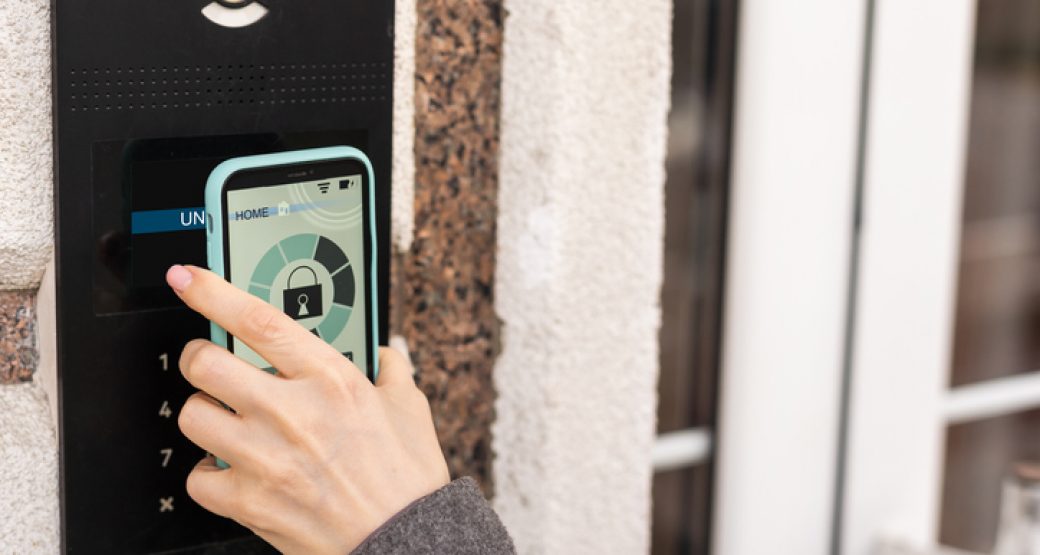In the days of old, people and businesses relied on simple systems to keep their physical assets safe (i.e. the old lock and key). However, as technology has advanced, so too has the need for more sophisticated physical security measures. Enter, mobile access control systems.
Mobile access control systems are security solutions that utilize mobile devices, such as smartphones, to grant authorized access to certain spaces. Today, mobile access control systems are frequently in place to secure both physical and digital assets, but for our purposes, we’ll be covering the physical considerations. Let’s take a closer look at where mobile access control systems started, how they have evolved, and the threats that modern-day systems must address to be effective.
The Beginnings of Mobile Access Control Systems
Starting with magnetic swipe cards in the 1970s, mobile access control systems have been a mainstay of security solutions for decades. They provided people with an easy and more secure way of entering buildings, facilities, and rooms without requiring the hassle of an entire set of keys.
Technology quickly advanced, and soon after the magnetic swipe cards, these systems started to include things like proximity cards, keypad access, and fobs.
However, all of these systems (aside from keypads) shared one notable flaw: the need for a separate physical item that could be lost, stolen, or duplicated by bad actors. Similarly, keypads, while more secure than the alternatives, introduced new security vulnerabilities in the form of PIN sharing and the need for frequent changes.
The need for an even more secure and convenient approach to physical security is where the new face of mobile access control systems originated.
The Evolution of Mobile Access Control Systems
With the rise of Big Data, IoT-connected devices, and the increasing frequency of cyber attacks, many might think that physical security has taken a back seat in terms of priority. However, the reality is that physical security is more important than ever. In fact, 75% of businesses identified physical security as one of their top priorities, and 60% of businesses have experienced a physical security breach in the last five years.
To meet these demands, mobile access control systems needed to evolve. Thus, in more recent years, sophisticated technologies like biometrics, smart cards, mobile apps, Bluetooth-enabled locks, and even IoT-connected devices have become the go-to for mobile access control measures. This approach provides businesses with a more robust approach to physical security by utilizing either personal characteristics that are nearly impossible to replicate, or devices that people are unlikely to misplace and that have additional security features of their own—think fingerprint and password protection for smartphones.
However, as security measures advance, so do the methods of criminals and other bad actors. This brings us to one of the biggest physical security vulnerabilities of the modern era: access control cloning.
Access Control Cloning: The Modern Day Security Threat
Access control cloning refers to the unauthorized duplication of access credentials. Traditionally, this could be done by obtaining a key and making a copy. Today, access control cloning has a new face in the form of digital pickpocketing. Believe it or not, hackers and other bad actors have found a way around the heightened security measures involved in mobile access control.
This can involve things like RFID scanning with a card reader, in which case someone only needs to be within reading distance of an access ID token in order to swipe the data. It can also involve more refined techniques like phone cloning, which gives the attacker access to all the data on your mobile or IoT-connected device. So, what is the latest response to this threat? The answer: encryption.
The Best Defense: Encryption
For the foreseeable future, encryption is the way forward for mobile access control systems. By securing the exchange of data between devices, encryption enhances physical security systems by working to ensure data confidentiality and making it much more difficult for attackers to clone your devices. With end-to-end encryption, you can have a mobile access control system in which your data is safeguarded throughout the entire journey, from your mobile device to the access control system and vice versa. All of which contributes to a much more secure environment for your physical and digital assets.
Enjoy the Latest Advancements with Mobile Access Control Systems from ProTech Security
At ProTech Security, we specialize in providing bespoke security solutions for residential properties as well as businesses, schools, government facilities, and more in Northeast Ohio and Central Florida. We’ve been in the security industry for more than 40 years. Our team of experts utilizes the latest in security technologies to safeguard your personal and business assets.
Our services include access control systems and mobile access app development. We’re here to support you through every stage, from installation and monitoring to maintenance and security engineering. Our access control systems are designed to bring you peace of mind for the long haul.
Ready to get started? Contact our team today and we’ll be in touch within 24 business hours.



